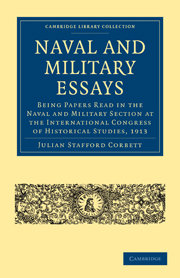 Naval and Military Essays
Naval and Military Essays Published online by Cambridge University Press: 07 September 2010
The Navy has had such an important influence on the development of England's national life that it may well cause some surprise to find that our people in general know so little of our Naval History, and still more, perhaps, to find that as a rule, until within the last forty or fifty years, our historians paid little attention to it. The notices they give of naval movements are quite perfunctory, relate only to those which come more distinctly into open view, and are chiefly remarkable for extreme misapprehension. I am not referring merely to the ordinary textbooks, though—as far as they are concerned—England might be in the geographical position of Bohemia, and it is from them that our young people get their first, and, in too many cases, also their last impressions. In their way, the greater historians are almost equally bad. The least so, in this respect, is Lord Stanhope (Mahon), who in his History of the Eighteenth Century—a period more than usually important in our naval history—does mention the chief patent facts, and, by avoiding details, avoids also gross blunders. But he had no knowledge of facts that were not patent. He did not know, for instance, the very important share that the Navy had in the failure of the Rebellion of 1745; and when he does go into detail, as in his account of the relief of Barcelona in 1706, he blunders egregiously, by trusting to a spurious journal, into the authenticity of which he had not examined.
To save this book to your Kindle, first ensure [email protected] is added to your Approved Personal Document E-mail List under your Personal Document Settings on the Manage Your Content and Devices page of your Amazon account. Then enter the ‘name’ part of your Kindle email address below. Find out more about saving to your Kindle.
Note you can select to save to either the @free.kindle.com or @kindle.com variations. ‘@free.kindle.com’ emails are free but can only be saved to your device when it is connected to wi-fi. ‘@kindle.com’ emails can be delivered even when you are not connected to wi-fi, but note that service fees apply.
Find out more about the Kindle Personal Document Service.
To save content items to your account, please confirm that you agree to abide by our usage policies. If this is the first time you use this feature, you will be asked to authorise Cambridge Core to connect with your account. Find out more about saving content to Dropbox.
To save content items to your account, please confirm that you agree to abide by our usage policies. If this is the first time you use this feature, you will be asked to authorise Cambridge Core to connect with your account. Find out more about saving content to Google Drive.